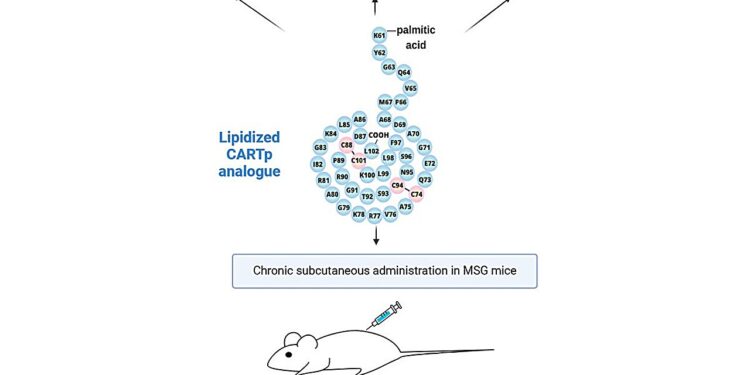Modified peptide derived from natural CART peptide. After repeated administration to mice with obesity and prediabetes, the mice began to eat less, lose weight, and their metabolism improved. Their brains showed reduced tau pathology, and new nerve cells also began to form in their brains. Credit: Charvát et al. Eur. J. Pharmacol. 980 (2024) 176864
Scientists from Dr. Lenka Maletínská’s team have developed a new promising compound derived from one of the peptides naturally present in the brain. Its application could help address two major health challenges: obesity and Alzheimer’s disease.
The neuropeptide CART is primarily associated with the regulation of food intake. Its modified version, created at the Institute of Organic Chemistry and Biochemistry of the Czech Academy of Sciences, has better stability and is more effective.
It suppresses appetite and protects the brain by reducing the pathogenicity of the tau protein, associated with the dreaded Alzheimer’s disease. The research results were published in the journal European Journal of Pharmacology.
The new compound successfully passed tests in cell culture and animal models. Obese and diabetic mice lost weight after its administration, and it turned out that they also had reduced pathology of the dangerous tau protein in their brains, one of the main symptoms of Alzheimer’s disease.
The modified molecule is effective in the body through a process called lipidization. This means that scientists have linked various fatty acids to the natural CART peptide and found that the modified peptide is able to cross the blood-brain barrier. This is an essential prerequisite for the drug to work properly in the brain.
“We found that when a lipid analogue of the CART peptide is applied subcutaneously, it then passes into the brain, where it acts by suppressing appetite and, if administered for a long time, also has a neuroprotective effect. It could therefore work in the treatment or prevention of neurodegenerative diseases,” explains the study’s first author, Vilém Charvát.
The peptide CART (cocaine- and amphetamine-regulated transcript) was discovered in 1998 by the Danish pharmaceutical company Novo Nordisk. It turned out that this peptide is abundant in the hypothalamus and has a relatively complex structure containing three disulfide bridges. However, it remains to be determined which receptor in the body it binds to. Efforts to discover it have so far been unsuccessful.
This is also the main goal of the lead author of the current study conducted at the IOCB in Prague, Dr. Andrea Pačesová, who says: “We have in our hands a potentially effective drug against obesity that also appears to reduce the risk of Alzheimer’s disease. To fully exploit this potential, we need to know why the substance works the way it does.”
“But if we want to describe the mechanism of action, we first have to decipher how the peptide gets to the brain. We know it works. All that remains is to identify the right receptors.”
Research on peptides potentially useful in the development of anti-obesity drugs is conducted at the IOCB in Prague by Dr. Maletínská. A few years ago, she concluded a licensing agreement for a promising substance with the pharmaceutical company Novo Nordisk.
She has long believed that anorexigenic peptides (which reduce appetite) could also be used for the prevention and treatment of neurodegenerative diseases. “We already know, contrary to what was originally thought, that new neurons are formed already in adulthood. This regeneration process is supported by several anorexigenic peptides, which can thus help repair damaged brain tissue,” explains Dr. Maletínská.
“If Alzheimer’s disease can be diagnosed early, in a stage called mild cognitive impairment, the chances of recovery appear quite high.”
More information:
Vilém Charvát et al, Lipidized analogues of the anorexigenic neuropeptide CART (cocaine-amphetamine regulated transcript) exhibit anorexigenic and neuroprotective potential in a mouse model of monosodium glutamate-induced obesity, European Journal of Pharmacology (2024). DOI: 10.1016/j.ejphar.2024.176864. linkinghub.elsevier.com/retrie …ii/S0014299924005533
Provided by the ASC Institute of Organic Chemistry and Biochemistry
Quote:Promising peptide compound may reduce appetite and protect brain against Alzheimer’s-like diseases (2024, August 21) retrieved August 21, 2024, from
This document is subject to copyright. Apart from any fair dealing for the purpose of private study or research, no part may be reproduced without written permission. The content is provided for informational purposes only.



